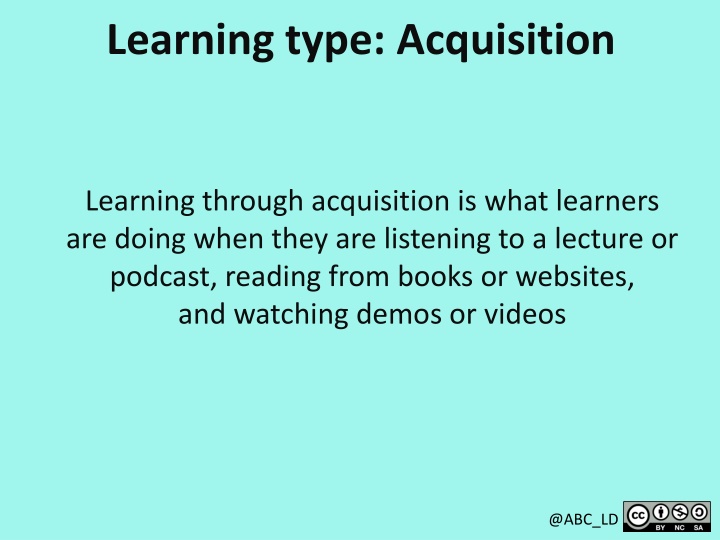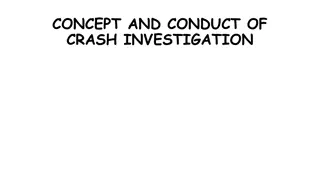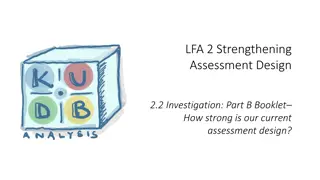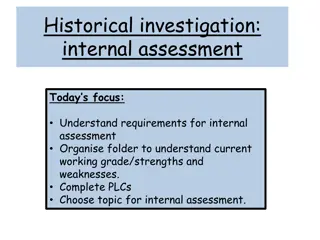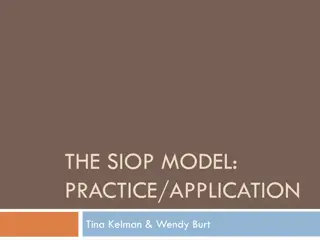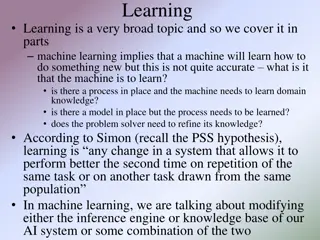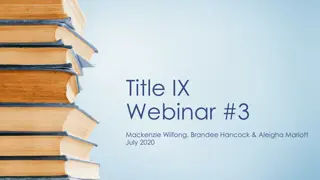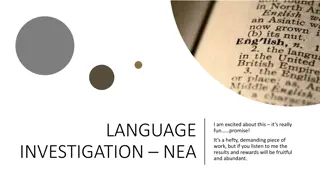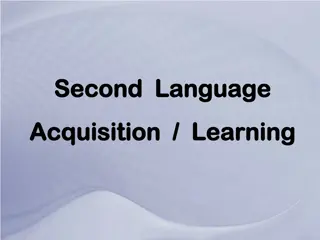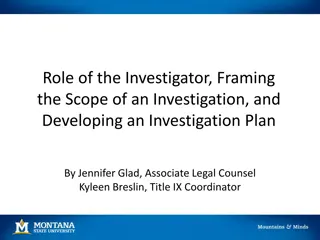Learning Types Overview: Acquisition, Collaboration, Investigation, Discussion
Different learning types such as Acquisition, Collaboration, Investigation, and Discussion, each emphasizing unique methods of knowledge acquisition and interaction. Understand how learners engage with content through various activities like listening, reading, discussing, and reflecting.
Download Presentation

Please find below an Image/Link to download the presentation.
The content on the website is provided AS IS for your information and personal use only. It may not be sold, licensed, or shared on other websites without obtaining consent from the author.If you encounter any issues during the download, it is possible that the publisher has removed the file from their server.
You are allowed to download the files provided on this website for personal or commercial use, subject to the condition that they are used lawfully. All files are the property of their respective owners.
The content on the website is provided AS IS for your information and personal use only. It may not be sold, licensed, or shared on other websites without obtaining consent from the author.
E N D
Presentation Transcript
Learning type: Acquisition Learning through acquisition is what learners are doing when they are listening to a lecture or podcast, reading from books or websites, and watching demos or videos @ABC_LD
Learning type: Collaboration Learning through collaboration embraces mainly discussion, practice, and production. Building on investigations and acquisition it is about taking part in the process of knowledge building itself @ABC_LD
Learning type: Acquisition Delivered - presented with information article reading digital documents, websites and resources watching video/animation Reading books, papers; listening to podcast, webcast Description Reading Post step discussion point Learning time
Learning type: Collaboration Networked - interact with networks of peers like comments and follow other learners building a joint digital output small group projects using online forums, wikis, chat rooms, etc. for discussing others outputs Conversational - converse with others, Reading books, papers; comments linked with each step Collaborative - construct shared understanding. Discussion step to explore learners perspectives and experiences Description Reading Post step discussion point Learning time
Learning type: Discussion Learning through discussion requires the learner to articulate their ideas and questions, and to challenge and respond to the ideas and questions from the teacher, and/or from their peers @ABC_LD
Learning type: Investigation Learning through investigation guides the learner to explore, compare and critique the texts, documents and resources that reflect the concepts and ideas being taught @ABC_LD
Learning type: Discussion Reflective - reflect on activities. Discussion to review previous steps synchronous and asynchronous seminars discussion forums and groups sharing experience, applying concepts to Reading books, papers; experience or examples, interacting with others web-conferencing tools online tutorials Description Reading Post step discussion point Learning time
Learning type: Investigation Browsing - seek and collate information using online advice and guidance Inquiry-driven - investigate authentic situations Problem-solving - solve problems or answer big questions comparing and analysing the ideas and information in a range of digital resources using digital tools to collect and analyse data and searching and evaluating information and ideas in Browsing - seek and collate informationand resources; Using conventional methods to collect Comparing texts, searching and evaluating information and ideas. Case-based - investigate individual cases Description Reading Post step discussion point Learning time
Learning type: Practice Learning through practice enables the learner to adapt their actions to the task goal, and use the feedback to improve their next action. Feedback may come from self-reflection, from peers, from the teacher, or from the activity itself, if it shows them how to improve the result of their action in relation to the goal @ABC_LD
Learning type: Production Learning through production is the way the teacher motivates the learner to consolidate what they have learned by articulating their current conceptual understanding and how they used it in practice @ABC_LD
Learning type: Practice using models Simulation - interact with a simulated world simulations virtual labs and field trips Cross-context - learn across physical or online role play activities Reading books, papers; social settings quiz Game-based - engage with game environments Description Reading Post step discussion point Learning time
Learning type: Production Construction - design and make artefacts producing and storing digital documents, resources, photos, videos, animations, blogs, e-portfolios representations of designs Performative - present for an audience Reading books, papers; Reflective - reflect on activities Discussion to review previous steps performances, artefacts models Assessing - learn by receiving constructive feedback (Peer review step) Description Reading Post step discussion point Learning time
ABC curriculum design The ABC Learning Design is built on curriculum design research from the JISC* (Viewpoints) and work of Prof Diana Laurillard, UCL IoE ** (learning types) and is adapted for design of programmes, modules, short courses and MOOCs at UCL @ABC_LD http://blogs.ucl.ac.uk/abc-ld Creative Commons Licence This work is licensed under a Creative Commons Attribution-NonCommercial- ShareAlike 4.0 International License @UCLDigiEd UCL Digital Education Please let us know if you are using the ABC resources and/or would like to be part of ABC community n.perovic@ucl.ac.uk and c.l.p.young@ucl.ac.uk * Viewpoints project (2008-2013), **Laurillard, D. (2012). Teaching as a Design Science: Building Pedagogical Patterns for Learning and Technology. New York and London: Routledge.
